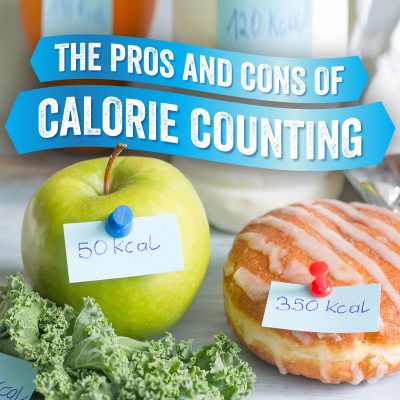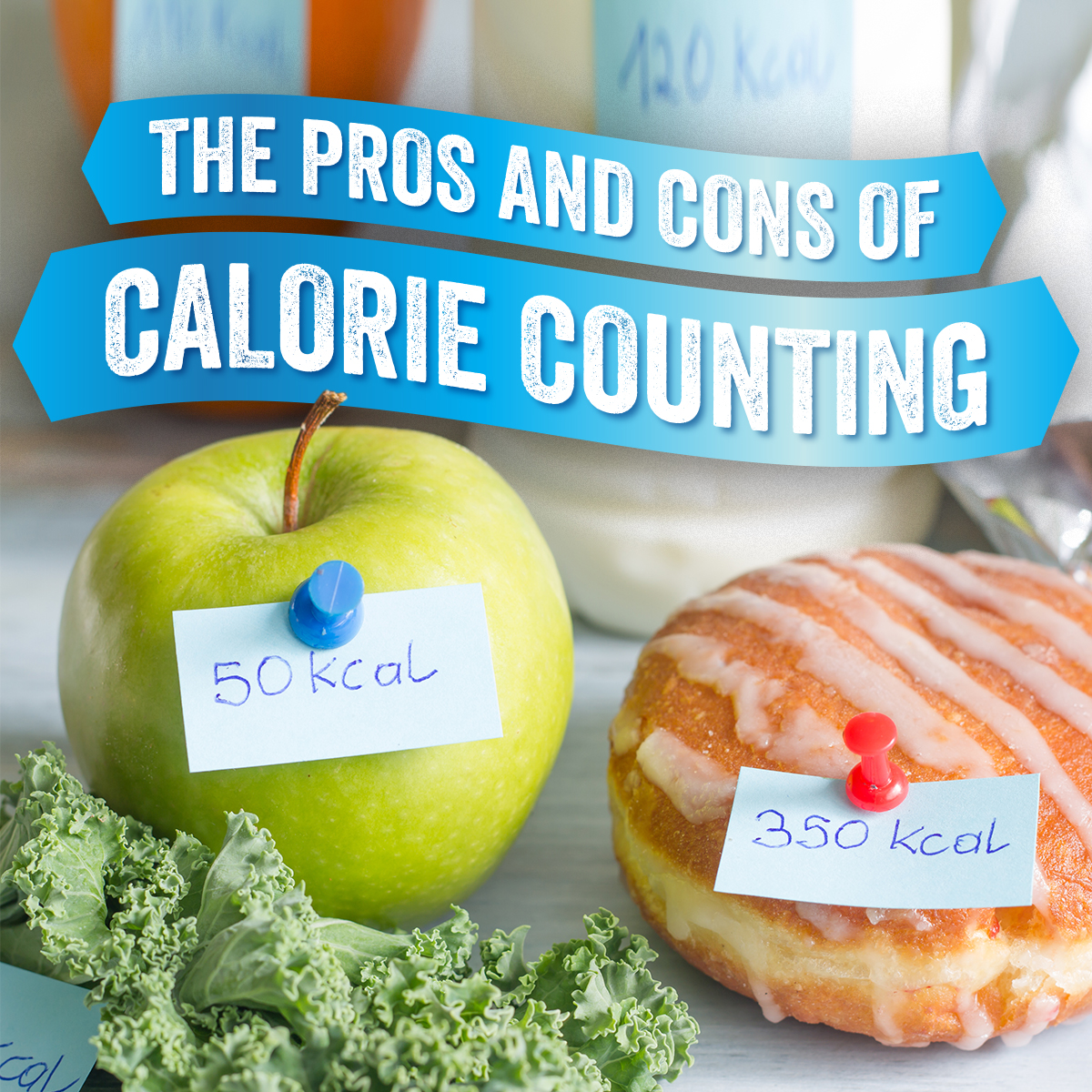
With so many different types of fitness trackers and calorie counters available, it seems as though it has never been easier to monitor our fitness goals. Right?! However – will it actually work? Is it just a waste of time? Are calories the only thing that matter for weight loss? We will discuss a list of pros and cons when it comes to calorie counting.
WHAT ARE CALORIES?
A calorie is a unit of energy measurement. It is defined as the amount of heat energy require to raise the temperature of 1 gram of water by 1C. Calories are used frequently to provide a numerical amount of energy that we obtain from the foods and drinks that we consume. Our bodies need energy to think, move, exercise and basically, live. Side note – when talking about food, we are actually referring to kilocalories (kcal). Now, technically 1 kilocalorie = 1000 calories. However, because the calorie is too small a measurement when talking about food, we like to use the term “calorie” instead of kilocalorie. As an example, 1 medium sized apple is actually 100 000 calories, however in food we just say 100 “calories”; shorter and convenient. And when reading food labels, food will be labelled as “calories” (kcal). Kilojoules (kJ) are the metric measurement of calories. To convert kilojoules into calories, you divide by 4.2.
PROS:
Calorie counting can provide some insight into food and nutrition that you may not have experienced or known about before; the benefit being that awareness of the nutritional content in foods can be a source of new knowledge for us. Subsequently, this can increase mindfulness of products that we might usually buy. Because we are becoming aware of the type and amount of macronutrients and calories in food, it can increase our awareness of our health and encourage healthy behavioural change.
Most fitness trackers on mobile devices for counting calories are an easy measurable metric, and some have a scanning tool for barcodes for easy documentation, saving time and effort. These apps can also be linked to food composition databases of the originating country. Mobile apps, compared to paper-based methods, have been shown to improve compliance and adherence of self-monitoring dietary behaviours1.
Reading nutritional labels to find products that will sit more into your macronutrients can cause you to think twice about your usual product. This can lead to better food choices as it can make you more aware as to which foods are more nutrient dense and which foods are more calorie dense, with less nutritional value. Being aware of where calories are coming from can:
• help you to cut back on foods that you may find yourself overeating unintentionally,
• highlight less than ideal dietary habits and can therefore help change behaviours not conducive to working towards your health goals, and
• lead to healthier swaps/alternatives of foods that you would usually buy.
Counting calories can bring more awareness to food products, can help you plan meals out more effectively, and create meal structure. Thinking about food ahead of time could ensure that you practice balancing out meals, include variety and help with portion control – thereby potentially saving money and decreasing food wastage.
Tracking calories also guarantees that you hit the macronutrients that you need to reach your goals. As you are quantifying how much you are actually consuming, it can be a means of keeping yourself accountable to what you eat; this minimises the potential to disassociate yourself from food.
CONS:
As calorie counting focuses more on quantity of food, some people may therefore forget about food quality. Reaching macronutrient and daily energy goals may come at a price of quality deficit.
The error rate of tracking calories is high, especially when it comes to selecting appropriate food substitutes. Often people grossly underestimate how much they are actually consuming unless you are properly weighing and measuring out every single thing that you eat and drink. How many times have you eyeballed a meal and assumed it was roughly x amount in grams and therefore must be y and z in macronutrients? The art of ‘guesstimating’ is especially hard when it comes to meals that are not cooked at home i.e. restaurant meals and takeaway options. The problem with estimating meal content is that more often than not, we will underestimate the amount of food we are consuming, allowing us to believe that we have more calorie availability than what we really do; this can lead to unintentional blowing out of our goals that calorie counting was meant to prevent in the first place!
Focusing on calorie counting and worrying more about reaching or not going over our calorie budgets can often make us miss hunger cues and ignore fullness cues. This is a form of body disassociation; it can form bad habits of stopping us from listening to the natural signs and signals that our body sends us when it comes to eating and food.
Calorie counting, recording food and taking measured quantities can be very time consuming, emotionally taxing, stressful and exhausting. Additionally, the ongoing strain of calorie counting is most of the time, unsustainable.
You may be eating in line with your macros, but what if they are not right for you? Where have you gotten your nutritional advice from? A qualified nutritional professional? If so, carry on. A social media personally? Maybe not. You may be undereating; doing yourself more harm than good. In this case hitting your calorie ‘goals’ may not be so ideal.
Research in males using MyFitnessPal found that a large percentage of users perceived the app as a contributor to eating disorders to an extent2. The study found that users demonstrated more symptoms related to eating disorders and psychological impairment, compared to non-users. Not to say that this means tracking calories will affect all who do in this way, but it is an interesting observation to note anyway.
The tracking apps may be subject to error, and may estimate portion sizes and nutritional information incorrectly. If scanning the food item’s barcodes using a mobile tracking app, the nutrient content of the label may be incomplete and therefore give inaccurate nutritional values.
It is best to know the positives and negatives before making an informed choice and decide whether something like calorie counting would be right for you. Hopefully the above helps with that a bit. If you feel like your relationship with food needs some guidance, it is best to receive individualised advice from a qualified nutritional professional, such as an accredited practising dietitian. Make an appointment with me today, and we will work together to achieve empowerment in your own food choices – with or without calorie counting.
Isabelle Jardine APD
REFERENCES
1Lieffer JRL, Hanning RM. Dietary assessment and self-monitoring with nutritional applications for mobile devices. Can J Diet Prac Res. 2012;73:e253-e60. doi: 10.3148/73.3.2012.e253.
2Linardon J, Messer M. My fitness pal usage in men: Associations with eating disorder symptoms and psychosocial impairment. Eat Behav. 2019 April;33:13-17. doi: 10.1016/j.eatbeh.2019.02.003.

